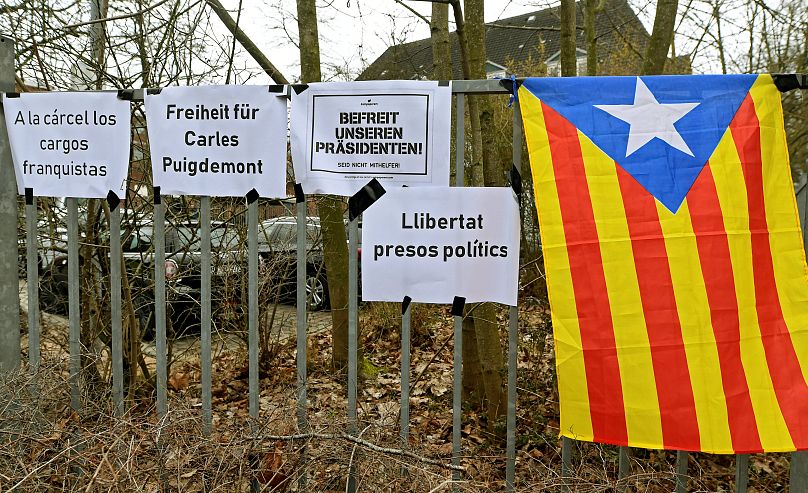Legal experts say German law may pose problems for Spain's extradition request for the ex-Catalan leader. In Belgium, Madrid abandoned its attempt.
Several German legal experts say they believe that the former Catalan president Carles Puigdemont, arrested on Sunday in Germany and in detention after appearing in court, will be extradited to Spain on charges of the misuse of public funds, rather than for rebellion.
The latter charge does not exist in Germany’s criminal code and extradition rules demand that the offence giving rise to the arrest warrant must also be punishable under German criminal law.
The Spanish government withdrew an international warrant when Puigdemont was in Belgium because some of the charges were not compatible with Belgian law.
On Friday the ex-Catalan president was one of 13 leading separatists from Catalonia to be charged with rebellion by Spain’s Supreme Court, which could bring a potential 30-year jail sentence.
Puigdemont fled to Belgium last year, as Madrid imposed direct rule in the wake of Catalonia's unilateral declaration of independence following a referendum. Both moves were illegal under the Spanish constitution.
Rebellion and German law
Under Article 81 of the German Criminal Code, a crime similar to that of rebellion in Spain exists as “high treason”. However, it must be linked to a violent act.
Legal analysts believe that could make extradition problematic – but not to the extent that a German court will refuse Spain’s request altogether.
One expert in criminal law, Nikolaos Gazeas, told Deutschlandfunk radio he believed that Puigdemont would be extradited for the misuse of public funds rather than rebellion, for that reason.
Martin Heger, a professor of criminal law at the Humboldt University in Berlin, agreed. He said in Der Spiegel that German justice would have to check in detail how similar the accusation of rebellion in Spain tallied with German law.
“It’s clear that the misappropriation of public funds is also a criminal offence in this case, so one thing is certain: Germany must deliver Puigdemont, usually within 60 days,” he said.
The European Arrest Warrant stipulates that once a person is handed over to the country making an extradition request, they can only be tried for the offence given as justification for the move.
“If the German court ruled that rebellion was not an extraditable offence, that would mean, if the German government agrees… that Puigdemont could not be accused of rebellion in Spain, only for the crimes for which he was extradited, and that would probably be for the misuse of public funds, which carried a much lower sentence range,” Gazeas explained.
Belgian move abandoned
The distinction is important because in Belgium too, the prospect of charges being restricted lay behind Madrid’s move to withdraw European Arrest Warrants for five leading Catalan separatists, including Puigdemont.
Even though it’s thought Belgium would have agreed to extradition on the lesser offence of the misuse of public funds, the Supreme Court in Madrid opted to keep only national arrest warrants in place – involving potential arrest only if they returned to Spain.
Whether or not Puigdemont’s actions were violent is also relevant under the law in Spain, where the matter has also caused controversy. Until the final years of the Franco era, “rebellion” did not need to be “violent”. However, the requirement was added to the penal code in 1973.
“There has to be violence, otherwise there is no crime of rebellion,” said former Spanish government minister Diego Lopez Garrido, when Puigdemont was accused.
Impact on German politics
In Germany, the arrest of Puigdemont has triggered a political debate. The Left Party called for the release of the former Catalan president. The party’s European spokesman in the Bundestag, Andrej Hunko, deplored his arrest – adding that in his view, rebellion was not an extraditable offence under the European Arrest Warrant.
The German Justice Minister, Katarina Barley, told ARD television she would not interfere in the case. "The first steps are now purely legal and we will have to wait and see," she said.
Franziska Brantner of the Green Party, a member of the German parliament, said it was now up to the judiciary to clarify how things would evolve – but that ultimately it was a "Spanish internal political conflict." Neither a German court nor the federal government could solve this problem, she said, which had to be tackled through dialogue between Madrid and Catalonia.
Alexander Lambsdorff, of the Free Democratic party, told the Augsburger Allgemeine newspaper that the arrest was creating major political problems. Spain’s internal constitutional conflict would now embroil Germany, he said – which Belgium had so far managed to avoid.












